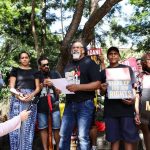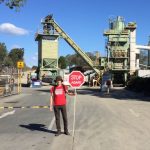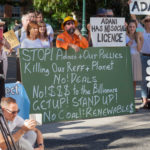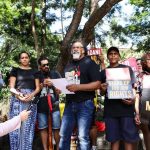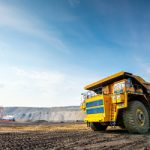Stop the City to Stop Adani: An Interview With NUS’ Lily Campbell
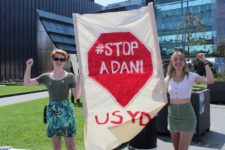
The Queensland Department of Environment and Science signed off on the final government approval that Adani needed prior to beginning work on its Carmichael coal mine in Queensland’s Galilee Basin. And the week following, the Indian mining giant started construction at the site.
Just two days prior to the May election, then environment minister Melissa Pryce signed off on the final federal government approval, which involved Adani’s groundwater management plan. Although, the CSIRO later came forward to say it had never ticked off on it.
Feeling the heat from the surprise Liberal Nationals election win, Queensland Labor premier Annastacia Palaszczuk announced she’d had a “gutful” of waiting for the decisions on the final two state government approvals, so she was going to ensure they’d be through as soon as possible.
And by mid-June, the state environment department had granted approval to both the black-throated finch management plan and the mine’s water plan. And as word of the final green light spread, one international headline read, The World’s Most Insane Energy Project Moves Ahead.
Fool’s gold
The Galilee Basin is around the size of the United Kingdom. And if the Adani mine, along with its accompanying rail link to the sea, are established, they will open up the region for five or six other proposed coal mines.
Clive Palmer spent $60 million on his own election campaign, which in the end seemed all about securing the re-election of coal-wielding prime minister Scott Morrison, so as to guarantee the opening of the basin.
Mining magnate Palmer is awaiting federal government approval for his own Alpha North coal mine project, which is supposed to not only neighbour Carmichael in the basin, but it would also produce more coal than it.
Yet, as is well-known, the drive for new coal in this country is occurring at the same time that large sections of humanity are calling for an immediate wind down to the use of fossil fuels around the globe due to the ever-rising impacts of the climate emergency.
Before it’s too late
But, despite the final approvals being rushed through and construction having begun, climate change activists are determined still to shut the project down. A Brisbane rally against the mine on 21 June saw the centre of that city brought to a halt during peak hour on a Friday afternoon.
And this Friday too, NUS’ University Students for Climate Justice and the Extinction Rebellion NSW are set to hold the Stop the City to Stop Adani rallies both in Sydney and Brisbane. Protesters in Sydney will be gathering at Town Hall at 5 pm on 5 July.
Sydney Criminal Lawyers spoke to the National Union of Students NSW vice president Lily Campbell about how the mine will lead to less jobs for Australians, the imminent need for action on climate change, and how the nation should be ready for an increasing amount of protests on the street.
Firstly, many would think that with the final approval through and construction having commenced, the Adani mine is now a given. Lily, why isn’t that the case?
I was reading recently about the Jabiluka uranium mine and the campaign to stop that. And largely, that didn’t start until the mine had been given all of the approvals.
If you want to change the world, you have to be prepared to disrupt and change the status quo. The mine is not built yet. And there’s definitely some space to stop it.
What do you think about the way both the federal and state governments dealt with the last environmental approvals?
It’s appalling that Adani’s environmental approvals have been rushed through. And the idea that the approvals are meaningful in anyway is appalling if the Adani mine can be approved by them.
It’s going to use so much groundwater and pollute it for so many years. And the coal there is going to be detrimental to the climate. So, either these Adani approvals are meaningless, or the government just wanted to rush them through in order to get it ahead as soon as possible.
It’s appalling the way it’s being managed. And both Labor and Liberal are firmly in the camp of we want coal.
In your understanding, what sort of impact will the Adani mine have on the climate emergency?
For the climate emergency, we need to take immediate and forceful action right now, and not wait or delay. Absolutely, we should have no new coal mines that will continue to put new coal into the market to be burnt for power. What we need is no new coal, no new oil, and no new gas.
The coal mines and the coal fired powerplants already here are having a devastating effect on the global climate emergency that we’re facing. For the last few years, Australian emissions have been on the rise. And this year again, they will go up.
The Adani project will have a limited impact on Australian emissions specifically. But, the coal that’s going to be dug out here, is going to be burnt in other countries, which will mean the climate is going to become increasingly worse.
And we’ve got to think about alternatives, before we reach the tipping point of the global climate disaster.
One of the major arguments touted for the mine is that it’s going to bring employment to the local region. Indeed, those protesting the mine are often criticised for not considering the jobs the Carmichael mine will bring to locals. How do you respond to this point?
The people who are talking about how many jobs the Adani mine will bring are lying. It’s been shown many times at many hearings and interrogations of the people running the mines, that the number of jobs is much smaller than what they were originally promising.
And most of the jobs are temporary and will involve the setting up of the mine, because most of the mine’s work and operations will be automated by robots. And the automation of the mines will mean that other coal mines already operating in Australia will be undermined and people will lose their jobs.
But, also, the question around jobs in rural areas is an important one. We should be spending a lot of money and have large-scale government projects in place that mean lots of people can have employment in the new renewable sector.
It will provide jobs for tens of thousands of people, particularly in Queensland: the sunshine state. There’s definitely room for many people to be employed in the renewable energy sector.
So, are you saying that the automation technology that’s being rolled out at Adani is set to be rolled out at other coal mines around the country?
No. It’s more like Adani would be at the cutting edge of automation technology. And they’re going to be producing a whole lot of coal from this. Any other new mines will also be using a whole lot of robots as well.
But, at the existing coal mines, workers are still operating most of the machinery. So, their jobs and positions will be undermined by the fact that what they’re producing will be something less valuable, because there will be a glut in the market.
It’s just a lie. Increasing the mines will mean there are less jobs. The more coal mines that are set up, the more it undermines the jobs that are already there.
There could be thousands more jobs in other fields. But, the government is running in the other direction, rather than setting up a new industry. They don’t really care about employing people. They just care about making money.
There’s a lot of figures being thrown around in regard to how long humanity has left to bring about a change. In your understanding just how urgent is the need to act?
The ICCP report that came out last year stated that we have 12 years left to stop runaway climate change and keep it to 1.5 degrees of warming.
Above that it will mean that we see much more explosive events. And it will also mean that it will be much harder to stop more of the actions of large corporations.
We have about 11 and a half years to hold the world to the 1.5 degrees. But, realistically, there are a whole lot of emissions that are already in the air and we’re already going in the wrong direction, not the right one.
So, it has to happen much faster, as it could already be that in 11 years’ time, we are locked into 3 or 4 degrees warming, which would be a total disaster for the planet.
The climate emergency is now. People speculate with 11 years or 12 years and give an estimation. But, what we are seeing now is an emergency. There are wildfires out of control. Western Sydney has seen its hottest temperatures ever.
This is an emergency that we have to start dealing with right now. And that starts with stopping brand new coal mines being opened.
A recent rally against the Adani mine in Brisbane saw activists bring parts of the city to a halt during peak hour. What are you hoping will happen this Friday afternoon in Sydney?
Hopefully, we will have hundreds of people, maybe a thousand turn up. We want to march through the city and shut it down to raise awareness around the issue.
And to say that we’re not going to accept the status quo, while the status quo is still burning more coal. We have to stop that if we want to make a real change in the world.
And lastly, Lily, you’re a member of the Extinction Rebellion. It’s one of the main groups behind the rising climate crisis actions being staged around Australia and indeed the globe.
Besides this Friday, what else is coming up? And considering Adani is not the only issue here, should Australians expect to start seeing an increase in the amount of climate crisis actions being staged?
Australians should be prepared to see a whole bunch of responses to the climate crisis. The Extinction Rebellion is just getting started in Australia. But, we’ve already organised and planned a whole lot of actions just in Sydney. And there are branches across the country.
Also the National Union of Students is organising a national student walkout for climate action on 9 August around the climate emergency
And the most important event that’s coming up is the 20 September Global Climate Strike. It will be an enormous mobilisation, so the government takes action on climate change.



